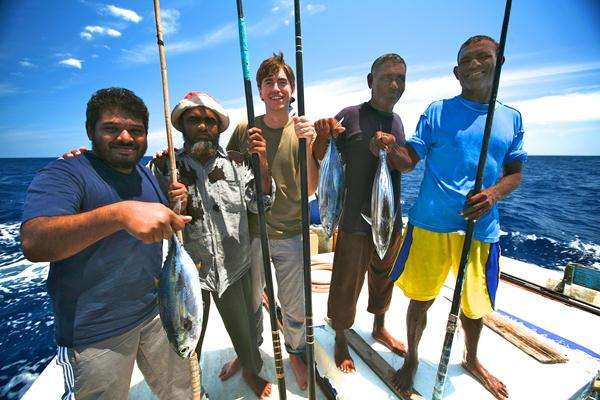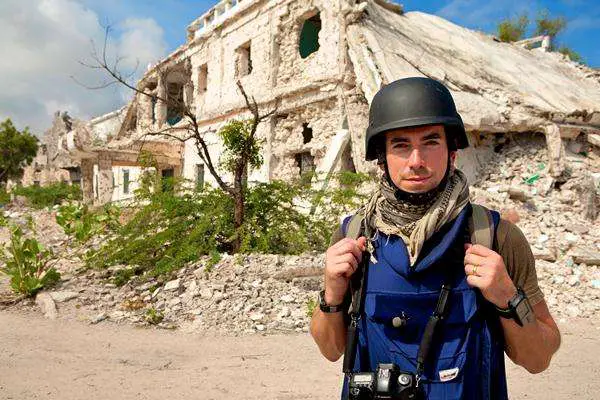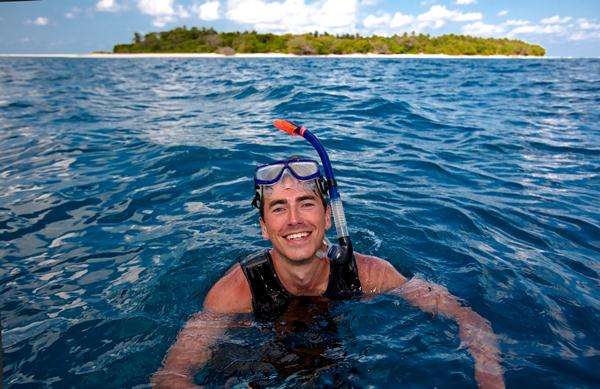Howdy there people in Travel Tart land. Today I’ve scored a chat with Simon Reeve who you may have seen presenting the cool travel documentaries Equator, Tropic of Cancer and Tropic of Capricorn (check out his site at Shoot and Scribble). These were epic journeys where Simon travelled along these imaginary lines, experiencing many countries and cultures along the way.
As an example, here is the Tropic of Cancer trailer:
He’s also written a couple of books, including One Day in September: The Full Story of the 1972 Munich Olympics Massacre and the Israeli Revenge Operation “Wrath of God” and The New Jackals: Ramzi Yousef, Osama bin Laden, and the Future of Terrorism.
Anyway, he’s been kind enough to stop what he’s doing for a quick chat with me, so here it is!
Simon Reeve Interview – He Talks About Invisible Lines!
The Travel Tart: Hi Simon, thanks for the opportunity to chat. I really liked the concept of the above mentioned travel docos – instead of throwing a dart at a world map to see where it lands and travel there, why not travel along all three lines on the map! What other lines are you thinking of travelling across? I was thinking, if you did a trip along the Arctic Circle, you might find a wide variety of ice!
Simon Reeve: It’s a great idea. We did think about a TV journey travelling around the Arctic Circle, but people just think it’s white and chilly, so we weren’t convinced they’d actually watch the programmes. But I’ve always been fascinated by Siberia, so I’d love to do it. The advantage of following a line is that it forces you to go off the beaten track and to places that travellers wouldn’t normally visit. When I was travelling around the Tropic lines we kept pitching-up in places that foreigners hadn’t visited for decades.
The Travel Tart: Like myself, you seem to travel to a lot of places that package tourists would avoid like the plague. Based on your travel experiences, what’s been the dodgiest place you’ve visited? That is, where you felt your personal safety was threatened?
Simon Reeve: The dodgiest for me is probably Mogadishu in Somalia. I went there a few years ago while filming a TV series about countries that don’t officially exist. We were going to democratic, stable and unrecognized Somaliland, in the north of the Horn of Africa, but stopped off in Mogadishu and I found myself buying a Somali diplomatic passport in my own name from a man called Mr Big Beard who’d liberated a stack of passports from the ministry during the war. It was chaos and we had to be protected by a dozen stoned heavily-armed local mercenaries. I was back in Mogadishu a few months ago while filming my latest telly series called Indian Ocean (basically a journey around the edge of the ocean from South Africa up to India and then back down to SW Australia), and we were up on the frontline with snipers shooting over our heads. It’s a frightening place. Three of us from the BBC went in there and we had flak jackets and helmets of course, but also armoured underwear to protect the vital bits. It’s not somewhere you ever feel really safe.
The Travel Tart: You visited the Central Asian states of Kazakhstan, Kyrgyzstan, Tajikistan and Uzbekistan in your series in ‘Meet the Stans’. I’ve been to Kazakhstan and can confirm that it’s nothing like what the Borat character says it is like – for example, wine isn’t made from horse urine and the biggest national export isn’t pubic hair. I really enjoyed Kazakhstan because there was virtually zero tourist infrastructure, and hence I saw the real deal. Plus the people were great and so friendly and hospitable! So hospitable in fact, that I think they pickled my liver with their vodka! I’m sure each of the ‘stans have it’s own appeal, but what’s your take on the Central Asian region which seems virtually unknown to most Westerners?
Simon Reeve: The dodgiest for me is probably Mogadishu in Somalia. I went there a few years ago while filming a TV series about countries that don’t officially exist. We were going to democratic, stable and unrecognized Somaliland, in the north of the Horn of Africa, but stopped off in Mogadishu and I found myself buying a Somali diplomatic passport in my own name from a man called Mr Big Beard who’d liberated a stack of passports from the ministry during the war. It was chaos and we had to be protected by a dozen stoned heavily-armed local mercenaries.
The Travel Tart: I’ve spent the odd spot on the Equator. One real surprise package for me was Muara Takus Temple in Sumatra Indonesia. I had the place to myself! What was your favourite spot on the three lines and why was this so?
Simon Reeve: A single favourite spot? That’s really tricky. On any of the journeys I do we’re having bizarre and memorable experiences every single day. If you twist my arm I’d say there was a part of the journey when we were travelling around the Tropic of Cancer through North Africa. We drove through a huge minefield and then travelled by train into northern Mauritania. It was a tough part of the journey, but endlessly memorable because we were crossing a remote and starkly beautiful region of the planet. That was my favourite spot on the lines. Camping overnight in the empty desert, we cooked bread in the sand, and then a lone Tuareg nomad in billowing robes appeared out of the darkness and sat down with us next to our fire. The rules of the desert ensured we shared our food and water with him, and then he disappeared back into the darkness. It was a magical moment.
The Travel Tart: I’ve eaten all sorts of weird stuff in my travels. What’s the most unusual, bizarre, or potentially vile thing you have ever eaten that hasn’t left you sitting on the toilet for a week?
Simon Reeve: Eating weird stuff is the whole point of travelling, isn’t it?! I’ve eaten some odd things, but never regretted it. I’m lucky that I have iron insides after years of eating the worst village food the planet can offer, so I rarely get sick. I’ve had zebu penis soup in Madagascar, fruit bat, grilled squirrel in Laos (it might have been rat), various dishes involving rotting meat, a plate of grub that included buffalo poo, fried maggots in several places, sheep’s eyes, camel hump, you name it. I was offered monkey brain in Borneo once, but I turned it down. That would be like eating a cousin.
The Travel Tart: When I go travelling, I love looking out for some of the funny signs that are around that often don’t translate well into English, or that are just plain funny (for example, the House of Curries Toilet Sign or the Be Nice to Health Workers notice. What’s your favourite?
Simon Reeve: You’ve found some good ones there. We just had a van with us while filming in Sri Lanka that had lettering down the side saying ‘Hyundai – copy right reserved, pls create a new object, only for create problems’.
The Travel Tart: I seem to attract all sorts of bizarre experiences, like Making Paper from Sheep Poo, watching Cockroach Races and trying not to buy Natural Viagra . What’s the single most bizarre travel experience you have encountered?
Simon Reeve: Tough one. I like yours and I don’t want to be competitive. But I was taught to fish by the President of Moldova, I’ve hunted with the Bushmen of the Kalahari, walked through minefields, witnessed trench warfare in the Caucasus, wandered through a radioactive waste dump in a shower curtain, and been adopted by a tribe of former head-hunters in Borneo. Single most bizarre was probably being arrested by the KGB in the unrecognized state of Transdniestria. Our fixer managed to get us out of the cells by telling them I was related to the Queen.
The Travel Tart: One thing that amazes me about travelling is observing the numerous ‘Masters of Transport and Logistics’ where the method of transport seems way too un-engineered for the loads expected of them (such as the Bali Motor Scooter, or How To Ride A Bike With an Ox. What’s been the most impressive load to transport method ratio you have observed?
Simon Reeve: The Ox pic is brilliant. I’ve seen six people on a motorbike in Bangladesh – four adults and two children, but they turned off the road before we could get a camera out. And I’ve seen a clapped-out old car that was stuffed full with loose oranges. And I mean full. They must have poured them in through the windows. The boot was overflowing with them. A little old man was driving it to market with a sack of more oranges on his lap. He couldn’t see left or right and there were oranges pressed against his windscreen.
The Travel Tart: And finally, where was the very first place where you thought ‘yeah, I love travelling?’
Simon Reeve: The very first time I crossed the channel from Britain into France with my family when I was a kid. We’d arrived in grey, wet Calais, but it still felt exotic and exciting. And I’ve never lost that feeling.
The Travel Tart: Awesome, thanks for your time Simon!
Simon Reeve: Thank you!! Happy travels!!
More Simon Reeve Stuff
SIMON REEVE is an adventurer and bestselling author who has travelled extensively in more than 110 countries and been around the world three times for the BBC TV series Equator, Tropic of Cancer and Tropic of Capricorn. His programmes have been shown by broadcasters in dozens of countries, enthralling millions. His most recent TV series is Indian Ocean, for which he travelled through 16 countries. Simon lives in London with his wife Anya, a camerawoman, who gave birth to their first child during a break in Simon’s Indian Ocean journey. More information: www.simonreeve.co.uk
Check out the multitude of Simon Reeve’s stuff, such as Tropic of Capricorn: A Remarkable Journey to the Forgotten Corners of the World and Tropic of Cancer.



Great interview. Simon has an awesome job. Not sure about wanting to visit Mogadishu though!
I wouldn’t want to be wearing a bullet proof groin protector either!